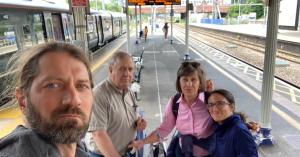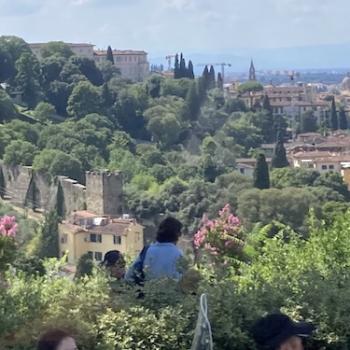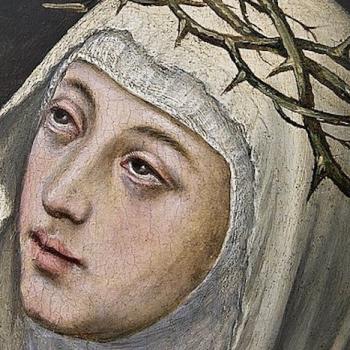
Transformative Travel
The next few blogs will be coming from the United Kingdom, where my wife and parents and I are currently knocking about. I’ve missed these opportunities to travel abroad over the last couple of years. It changes us, doesn’t it? The unexpected events that fill a day, the face to face interactions with people whose lives are so different from our own.
I’ve already had the privilege of spending some time with Dr. Celia Deane-Drummond and her colleagues at Campion Hall, Oxford. Celia runs a theological institute inspired by Pope Francis’s ecology encyclical. How might the Christian intellectual community be a gathering point for various streams of conversation about our planetary crisis? Could scripture and the formative theological tradition help us hear in climatology, for instance, the groaning of creation that Paul speaks of?
It’s remarkable work they’re doing. My point in writing about it at this moment is simply to note that being in that space with those folks is likely to change me a little bit. My wife, Dr. Stephanie Ramirez, is a specialist in transformative travel. How does knocking about England and Scotland, for instance, become the sort of travel that can change our lives? The answer is complex and multifaceted, it turns out. But one key facet is in our readiness for new encounters. As amazing as Christ Church, Oxford, was, it’s likely to be the connection with Dr. Deane-Drummond, or even our inimitable Air B&B host, that leaves the deeper mark.
Leaving Home
Stephanie’s research has helped me name something that I’ve felt intuitively for some time. Felt and attempted to live, I think. Encounters with difference bring us a little closer to the God whose transcendent beauty is refracted through all creatures. My little systematic theology, which I’ve summarized here, works with a guiding metaphor that runs parallel to Stephanie’s research in social science (how about that? Like attracts like, even when it’s different!). Those Emmaus disciples leave home and go to Jerusalem to hear about the different encounters with the risen Christ that Simon Peter and others have experienced. That, I think, is when true theology begins. When we take a bold and vulnerable step beyond naming our own convictions, and look for language that can give an account of the strange new world we encounter only in the experience of others. Theology begins in leaving home.
Staying Home
While suffering through the inevitable jet lag this week, I’ve been reading a mind-blowing book about some very isolated Christians. Sarah Riccardi-Swartz writes in her book Between Heaven and Russia about her immersion with a community of Russian Orthodox monks in West Virginia. The monks are converts, mostly from Evangelical traditions. And they have come to believe some very strange and, I’ll go ahead and say, theologically wrong-headed things. Like, super wrong. The Virgin Mary, through her iconographic presence at the monastery, is holding back the apocalypse until Tsar Nicholas, embodied in Vladimir Putin, can enter America as God’s chosen saint who will defeat the Anti-Christ. That sort of strange and wrong-headed. I just wanted you to know I don’t throw those terms around cheaply.
I’ll likely have more to say about Riccardi-Swarz’s book later. For the moment, the quality I want to name is isolationist zeal. These young monks have walled themselves off from the world. Not just the world, but other Christians. Not just other Christians, but other Eastern Orthodox Christians. Actually, not just that, but Russian Orthodox Christians. I could go on. Riccardi-Swarz does.
A God We Encounter in Others
You know the story. In our quest for an authentic Christianity, we wall ourselves off from those whose lives, convictions, and encounters with Christ (or God, or existence) is different than ours. In doing so, we’re like a traveler who wishes everyone would go away so he can have a more authentic experience of a the Eiffel Tower. And he returns more or less the same person he was when he left. That’s how travel becomes a way of staying home. Faith can get warped the same way.
It’s fear, mostly. If I listen carefully to you I might develop empathy. Then I might have to expand my own way of seeing the world. Much easier to stay home. And wall myself in.
I’m not critiquing ascetic practice as such. There is a beauty to solitude, especially in the ancient eastern and western monastic tradition. At its best, the monastic calling is a withdrawal from the public space, a particular vocation to pray and to work in quietude. Even the withdrawal from society can be a way of letting others have their own experience of God without my interference. Rowan Williams has written about this. In that sense, solitude is open to “leaving Emmaus,” attending to my own encounter and trying not to overpower the encounter my neighbor is having or may have with the same God. Solitude may even help me listen to something new.
But isolation can also be a way of staying home. Of refusing to brave the wild new world of other people. I believe the God who is beyond my small life and experience is the God waiting to meet me in the people I meet. People whose lives are beyond my comprehension. Lives I’ll only ever glimpse through a glass darkly, and even then only if I take the risk of traveling to where they are. Literally or metaphorically.
It’s a lesson I am still learning, and people like Celia, Stephanie, and Sarah are my guides in this journey.
May yours be surprising, wild, and blessed as well.










